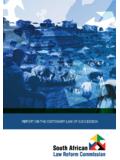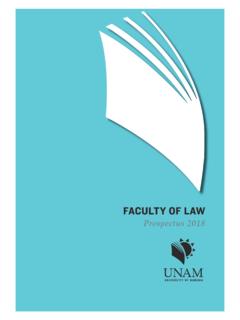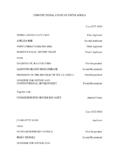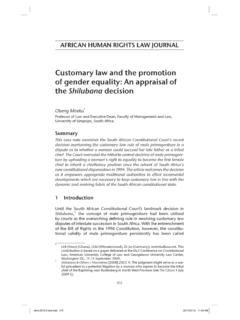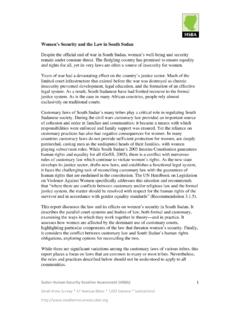Transcription of UGANDA LAW REFORM COMMISSION
1 UGANDA LAW REFORM COMMISSION STUDY report ON THE REVIEW OF LAWS ON succession IN UGANDA JULY 2013 TABLE OF CONTENTS CHAPTER ONE .. 3 INTRODUCTION AND BACKGROUND TO THE STUDY .. 3 Introduction .. 3 Background and context .. 4 Statement of the problem .. 8 Objectives of the Study .. 9 Scope of the study .. 12 CHAPTER TWO .. 13 LITERATURE REVIEW .. 13 Introduction .. 13 Gaps and Anomalies .. 14 Discriminatory provisions .. 24 Customary heir .. 43 Separation and its resultant effects .. 43 Right of the widow to letters of administration .. 45 Cohabitation .. 46 Entitlement of dependant relatives .. 49 Customary Practices of succession .
2 52 Legal pluralism .. 54 Religious Practices (The position of Islam) .. 56 CHAPTER THREE .. 86 METHODOLOGY OF THE STUDY .. 86 The Study Design .. 86 Population and Area of study .. 86 Data Collection Techniques .. 88 Data collection methods .. 90 Procedure .. 90 Fieldwork .. 91 Data Analysis and report writing .. 91 FINDINGS OF THE STUDY .. 92 Introduction .. 92 Knowledge of the law .. 92 Areas of the Law Requiring Law REFORM .. 94 Testate succession .. 98 Intestate succession .. 116 Cohabitation .. 130 Customary Heir .. 131 Challenges faced by implementers of the law when dealing with administrators of estates .. 132 Mechanisms in place to check the powers of an administrator.
3 133 Challenges in enforcing the available mechanisms .. 134 How implementers address mismanagement by Administrators .. 134 Office of the Administrator General .. 136 Services offered by the Office of the Administrator General .. 137 Intermeddling with property of the deceased .. 143 Judiciary/ Formal Courts .. 146 CHAPTER FIVE .. 152 CUSTOMARY NORMS AND PRACTICES OF succession IN UGANDA .. 152 Introduction .. 152 Nilotic Ethnic Group .. 152 Nilo Hamites Ethnic Group .. 153 Bantu Ethnic Group .. 155 Influences of customary practices on succession .. 160 Distribution of property /Property inherited .. 163 Decision making by women in matters of inheritance of an intestate.
4 167 Effectiveness of customary practices of succession .. 169 Perception on the growing influence and equality of women in property ownership and succession .. 170 Conclusion and Recommendations .. 171 BIBLIOGRAPHY .. 172 Annex 1: LEGAL AUDIT OF succession LAWS .. 176 3 CHAPTER ONE INTRODUCTION AND BACKGROUND TO THE STUDY Introduction The UGANDA Law REFORM COMMISSION with support from the Justice Law and Order Sector undertook a study to review the laws of succession in UGANDA . The purpose of the study was to ensure among others that; the provisions of the laws of succession are in conformity with the 1995 Constitution of the Republic of UGANDA , national laws and international and regional human rights standards and practices, are up to date with the changing socio economic circumstances of UGANDA , and that the law is accessible to the people and its implementation can be better realised.
5 succession means the acquisition of rights and/or property of a deceased person by law. The terms succession and inheritance are commonly used interchangeably. For purposes of this study, we shall restrict ourselves to the use of the term succession which is the legal term. In UGANDA , succession is provided for under various laws. These include; the Constitution of the Republic of UGANDA , 1995, the succession Act1, the Administrator Generals Act2, the Estates of Missing Persons (Management)Act3, the Administration of Estates (Small Estates) (Special Provisions)Act4 , the Local Council Courts Act5, the Probate (Resealing) Act6, the Trustees Incorporation Act7, the Public Trustee Act,8 the Administration of Estates by Consular officers Act9, the Administration of Estates of Persons of Unsound Mind Act10, the Church of England Trustees Act11 and the Local Governments 1 Cap 162.
6 2 Cap 157 3 Cap 159 4 Cap 156 5 Local Council Act, 2006. 6 Cap 160 7 Cap 165 8 Cap 161 9 Cap 154 10 Cap 155 11 Cap 158 12 Cap 243 4 These laws set out the substantive law and procedures for matters of succession such as: the succession rights of widows/widowers and children during both testate and intestate succession , protection accorded to the different sexes in succession matters, powers and duties of the office of the Administrator General; powers and duties of an administrator or executor of an estate; jurisdiction of the courts; procedure for obtaining letters of administration or grant of probate; and offences arising there from. Owing to the large scope of the succession legal regime via avis the limited resources, this study mainly focused on the succession Act, Cap 162 and the Administrator General s Act, Cap 157 and occasionally made reference to the other laws on succession afore mentioned.
7 Background and context Historical background succession Ordinance, 1906 The origin of UGANDA s law of succession can be traced as far back as the succession Ordinance of 190613, which was adopted from English law. The Ordinance introduced the British models of succession and inheritance into UGANDA as the law applicable to all cases of intestate or testamentary succession . However, the Ordinance exempted the estates of all natives of the protectorate from the operation of the succession Ordinance and estates of Mohammadans were exempted from the provisions of Part V of the Ordinance. Part V of the Ordinance provided for the distribution of an intestate s property14.
8 The Ordinance did not exhaustively provide for testate succession and generally fell short on intestate succession especially with respect to the different interests in an intestate s property of the Ugandans who were left to apply customary and cultural practices of succession with their shortfalls. The Ordinance further discriminated against illegitimate children and relatives in succession matters by its recognition and preference to legitimate children and relatives. Illegitimate children took a secondary position only if at the time of writing the will or intestate s death had acquired the reputation of being such a The Ordinance saved the application of religious and customary law by natives in succession matters.
9 Hence Africans religious (Muhammadan) and customary practices continued to influence their decisions in handling 13 Subsequently the succession Act. 14 General Notice of 22nd January 1906. 15 S. 87 succession Ordinance 1906 5succession matters. Those Africans who preferred the customary way of handling succession still continued to apply customary practices alongside the statutory law. This sowed the seeds for the legal pluralism that surrounds the law of succession in UGANDA today. In matters of testate succession , the Ordinance presupposed that it was only the husband who would make a will16 as well as appoint a testamentary guardian for his children17.
10 The widow of an intestate was entitled to 1/3 (one third) and 2/3 (two thirds) went to the lineal descendants, about 30% compared to the 15% which is given to the widow(s) under the current succession Act. succession (Amendment) Decree, 1972 Due to the shortcomings in the succession Ordinance of 1906, the law was subsequently amended in 1972 by the succession (Amendment) Decree18, to provide for succession to estates of Ugandans dying intestate and restricted the disposal of property by will among other things. The new law recognised the rights of illegitimate and adopted children. The definition of a child in the Decree included legitimate, illegitimate and adopted children19.
